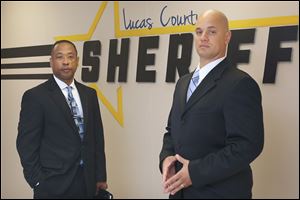
COMMENTARY
Sheriff gives deputies another role in drug fight
7/6/2014
Tharp
THE BLADE
Buy This Image

Lucas County sheriff’s deputies Charles Johnson, left, and Damian Worthy are two members of a new initiative that focuses on helping addicts seek treatment. The deputies work with the families of addicts and make house calls on people who are on record as having overdosed in the past year.
State and local police continue to make record drug seizures, but fatal overdoses continue to soar. Reducing the demand for drugs is the only real way out, and that requires a new way of doing business, even for law enforcement.
Heroin-related deaths in the Toledo area more than doubled last year — to 80 from 31 in 2012. And the toll continues to rise. The region reported roughly 60 heroin-related overdoses during the first five or six months of this year; it’s on pace to reach 130 or 140 for the year, Dr. Robert Forney, Lucas County’s chief toxicologist, told me last week.
Heroin has become a cheap way to satisfy opiate addictions that usually start with prescription painkillers such as Vicodin and OxyContin.
Most cops know they can’t arrest their way out of a drug problem. Attorney General Mike DeWine says it in practically every speech.
But Lucas County’s top cop, Sheriff John Tharp, is doing more than talking about it. With his new Addiction Resource Unit, he’s changing how law enforcement reacts to Ohio’s opioid and heroin epidemic, arguably the state’s biggest public health problem.
“As law enforcement, we need to do more,” Mr. Tharp told me Wednesday. “We’re trying to save lives. I just felt we had to do something different.”

Gerritt
Two weeks ago, Mr. Tharp launched a four-person addiction unit, including two deputies who now work as full-time addiction resource officers. They will investigate overdose deaths, meet family members at hospitals in nonfatal cases, and conduct follow-up interviews at their homes. They’ll also work with addicts — and their families — who have had trouble with the law, mostly by stealing to support their habits, but are now seeking help for their addiction.
As first responders, law enforcement officers are in a good spot to help. Working with local treatment and prevention agencies, including A Renewed Mind and Awake, deputies will try to get people into drug treatment. They’ll also work with the Metro Drug Task Force to investigate dealers.

Tharp
It’s a delicate dual role. Many people don’t trust cops. Mr. Tharp picked the addiction officers partly for their passion and ability to work with people.
The unit includes a sergeant, Joe Gorney, who supervises the addiction officers, and a lieutenant, Andrea Luna, who also works on domestic violence cases. She’ll help monitor the success of the addiction resource unit by documenting outcomes and compiling statistics.
Mr. DeWine told me he liked the idea of cops stepping out of their traditional roles to help with treatment. He’s considering using Lucas County’s new addiction unit as a statewide pilot. He also said he would try to get some grants for the office.
Mr. Tharp could use the money. He wants to dedicate two more deputies to the unit and enlist a part-time employee from the Mental Health and Recovery Services Board of Lucas County to work directly with his addiction resource officers.
The sheriff has told local 911 dispatchers to notify the office of every drug overdose. With overdoses rising, the new unit already has at least 40 cases.
The addiction resource unit may be the first of its kind in Ohio — even the country. Officers drive unmarked cars and wear civilian clothes, meaning shirts and ties.
It’s not traditional police work, but addiction resource officers Charles Johnson and Damian Worthy embrace their new role.
“This is not normal for us,” Mr. Johnson told me. “When I knock on a door, people think I’m there to run a warrant. I love to see the smile on their face when they know I’m there to help.”
Even the vocabulary is changing. Mr. Johnson and Mr. Worthy refer to people struggling with addiction as “victims,” not “suspects.” The deputies are not there to arrest the people they’re trying to help.
Officers give family members support boxes, which include information about addiction, referrals to local treatment providers, and a drug-testing kit.
“You have to get the families on board,” Mr. Worthy told me. “People suffering from the addiction are going to have weak days. They need to have people there supporting them.”
Carol Justen a bus driver who lives in Springfield Township, applauded the initiative. Addicted to heroin, her 28-year-old son has been in and out of jail the last three years.
Six or seven years ago, Ms. Justen couldn’t get the sheriff’s office to respond to her complaints about neighborhood drug dealers. Now deputies are trying to help her son get into treatment.
“I’m all for this,” Ms. Justen said. “Our family members are dying. Being proactive makes more sense than being reactive.”
Sheriff Tharp, who oversees an annual budget of about $28 million, had no money set aside for the addiction unit. Given the crisis, he didn’t want to wait for the county to authorize more staff or for a state or federal grant. To fill the positions, he used deputies already working for the sheriff’s office.
Sheriff Tharp will backfill with overtime pay. If he runs a little over budget at year’s end, he’ll hope Lucas County Commissioners Carol Contrada, Tina Skeldon Wozniak, and Pete Gerken cut him some slack. My guess is that they will. They’ve backed the initiative from the start.
The sheriff isn’t expecting miracles. If the addiction unit can save one life, it will have been worth it.
“We know some people will fail,” said Mr. Tharp, who took office last year. “When they do, we will continue to work with them and help them get back into treatment.”
There’s a new sheriff in town — and a new way to fight addiction in Ohio.
Jeff Gerritt is The Blade’s deputy editorial page editor.
Contact him at: jgerritt@theblade.com, 419-724-6467, or follow him on Twitter @jeffgerritt.